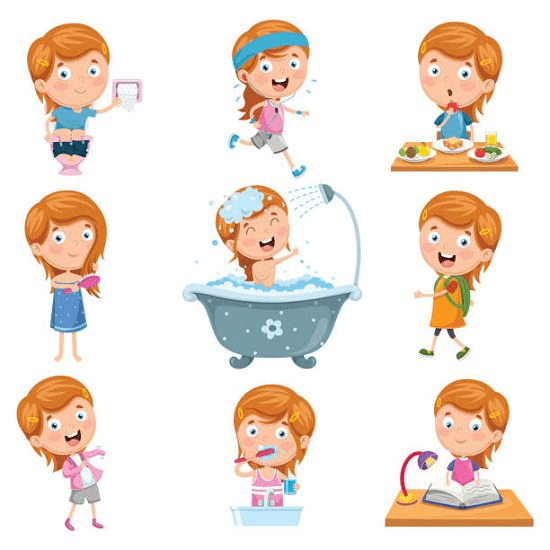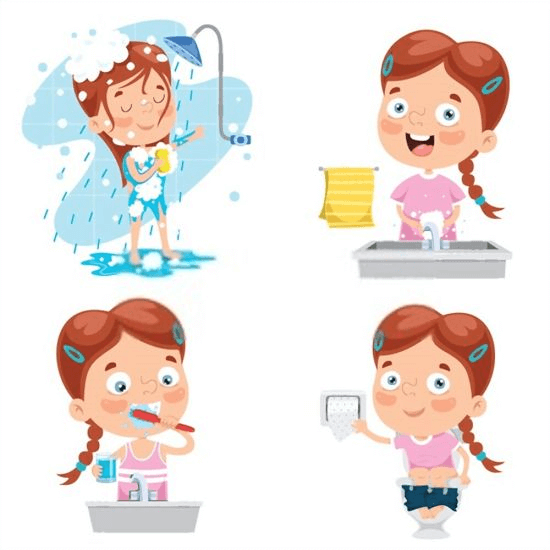Personal Hygiene DefinitionMaintaining personal cleanliness is important for upholding your health and wellbeing. In order to stop the spread of infections and diseases, it is essential to keep your body, clothing, and surroundings clean and orderly. 
Personal hygiene involves:
These activities can help protect you from illness, improve your self-esteem, and make a good impression on others. OverviewPersonal hygiene is a special practise that aims maintain your health and the health of others. It entails washing your hands and body, brushing and flossing your teeth, grooming your hair, and caring for your skin and nails. It also includes wearing appropriate clothing and footwear, making sure you stay hydrated, getting enough sleep, and avoiding risky activities that can result in infection or injury. DefinitionOne of the greatest methods to prevent gastrointestinal or infectious problems like Covid-19, the flu, and colds is to practise good personal hygiene. Using soap to wash your hands will get rid of any bacteria that could make you sick. You can avoid infecting others with infections by practising good personal hygiene. Keeping yourself clean includes:
What Makes Personal Hygiene So Crucial?Maintaining good hygiene is essential because it helps stop you and your kids from catching or spreading infections and germs. By contacting others, touching faeces (poo), trying to handle contaminated food, or interacting with unclean surfaces or things, you might spread the bacteria responsible for many diseases. Personal Hygiene PractisesPersonal hygiene is viewed differently by each individual. To establish healthy hygiene habits, it is helpful to start with the following major categories: 
Toilet CleanlinessWhen you're done using the loo, wash your hands. Make sure to clean in between your fingertips, on the backs of your hands, and underneath your nails while you exfoliate with soap for 20 to 30 seconds. Use warm water to rinse, then pat dry with a fresh towel. A liquor sanitizer will also help if you don't have access to running water or soap. Choose one that contains at least 60% alcohol. Shower EtiquetteThe frequency of your showers may depend on your own preferences, but most people can benefit from a wash at least nearly every single day. Using soap in the shower can help wash away oils, germs, and dead skin cells. Also, you ought to shampoo your hair no fewer than twice every week. By washing your hair and scalp, you may protect yourself from greasy residues that might irritate your skin and help remove skin build-up. In-hand HygieneTo maintain your nails neat and short, trim them frequently. To remove debris, dirt and bacteria from under them, use a towel or nail brush. You can avoid transferring germs to your lips and other bodily openings by keeping your nails neat. Also, you need to stop biting your nails. Dental HygieneThere are more benefits to good dental hygiene besides having white teeth. Gum disease and cavities can be avoided with proper dental and gum care. At least twice every day, brush for two minutes. Brush as soon as you get up and before you go to bed. Brush right after each meal if you can. Every day, floss between your teeth, and discuss using an antimicrobial mouthwash with your dentist. These two procedures can help stop tooth decay and get rid of spaces where germs and bacteria can grow. Illness ManagementYou should take precautions to avoid infecting others if you're feeling under the weather. This entails not exchanging any utensils or electronics, protecting your mouth and nose while sneezing, cleaning shared areas with an antiseptic wipe, and more. Furthermore, discard any used tissues right away. These are some ailments that might arise from poor personal hygiene;COVID-19 and other infections disorders, such as staph infections and diarrhoea, particularly gastroenteritis and respiratory infections including colds and the flu worm-related illnesses such threadworms, scabies, trachoma, a blinding eye infection, tinea, or athlete's foot, as well as dental decay. Using Body WashStrive to take a daily shower or bathe. Cleanse thoroughly, paying special attention to the areas around your genitalia and anus. Maintaining cleanliness will eliminate microorganisms that produce body odour and stop skin irritations. Use soap, shower gel, or a sensitive body wash to wash yourself. More bacteria can be removed using soap, but you might need to wash delicate body parts in tap water or salt water first. Use a fresh, moist cloth or sponge to clean yourself if there isn't any or very little tap water available. The Way of Hand Washing
Hand sanitizer is an additional option. Be sure to apply enough of the ointment to completely cover your hands. Make careful to rub your hands' palms, backs, and between your fingers. Washing your Private PartsGuys who have not had circumcision can wash their penis by gently drifting back the foreskin and using warm water or soap beneath. Learn more about penis care here. Women should use a soap-free wash, salt water, or plain water to gently cleanse the delicate skin all around vulva. Avoid fragrant soap and bathroom products because they could irritate the vulva's delicate skin. Don't douche; it disturbs the beneficial bacteria inside the vagina. Wash your vulva as usual when you are menstruating (during your periods). Change your tampons every three to four hours. Never place over than one tampon at once or leave a tampon in for an extended period of time to prevent toxic shock syndrome. Replace sanitary napkins. Wash your hands before and after changing tampons or pads. Stopping Body OdourApply perfume to your underarm after you've washed. Put on some fresh, dry clothes. If at all feasible, hang wet or unclean clothes to dry outside after giving them a thorough wash. Schedule a time to see your doctor if you struggle with excessive perspiration. Safe Food HandlingBefore and after making food, wash your hands. By doing this, you will avoid contaminating food and risking illness or spreading bacteria from raw meat or other contaminated items. Learn more about food safety here. Keeping Foul Breath at BayPoor oral hygiene can lead to bad breath. You should wash and brush and floss your teeth twice a day to prevent gum disease and eventual tooth decay. If you experience any further symptoms, use these dental hygiene guidelines and schedule a checkup appointment with a dentist. Shoes and ClothingSignificant amounts of water, electricity, and chemicals are used when doing laundry. It is also the toughest phase of the life cycle of garments. The requirement for kids to dress in clean clothes must be balanced with this resource utilisation. That entails clothing that doesn't smell bad or seem clearly soiled. Pants and socks should be changed at least once a day and whenever they become soiled. Once they start school, your child can hang up their uniform at the end of each day to air it out. What Does Children's Personal Hygiene Entail?To be healthy and feel good about themselves, your child requires maintaining themselves clean. Their sense of self-worth and confidence will increase thanks to good personal hygiene. Things that may have a detrimental impact on hygiene Poor personal hygiene can be negatively impacted by both poverty and a lack of access to clean water. The way a person takes care of themselves might be impacted by their mental health. It can be exceedingly difficult for people to maintain a personal hygiene routine when they suffer from certain conditions, such as mental disorders, severe depression, or a drug or alcohol use disorder. Conditions That Inadequate Hygiene May IndicateWhile poor personal hygiene might contribute to some health problems, it can also have unintended consequences in other cases. Poor oral hygiene is common among those with Alzheimer's disease and other forms of dementia Reliable Source. Depression may occasionally be the cause of a person's failure to maintain a hygienic practise. Maintaining a self-care routine might be more challenging when experiencing depressive symptoms, such as decreased energy and diminished cognitive function. Inadequate Personal Hygiene May Be a Sign Of Other ProblemsSomeone you know may be depressed if they haven't showered or are untidy-looking. According to Novey, "people disregard themselves when they are sad or depressed." Some people might benefit from discussions about the value of good personal hygiene for avoiding illnesses and the provision of personal hygiene supplies. Be direct in your conversations, but yet considerate and understanding, advises Novey. Even with all your efforts, your friend or loved one might still require expert assistance. If their basic grooming does not improve, you ought to persuade them to consult a therapist or a physician. Negative Consequences of Inadequate HygieneIt might be challenging to discuss poor hygiene with someone because it is a delicate subject. A individual with poor individual hygiene may consequently become socially isolated. The workplace may also be affected by poor personal hygiene. Those who seem to prioritize their well-being and appearance could be more likely to receive employment offers and promotions from organisations. In the food sector, poor personal hygiene could be especially hazardous. Poor personal cleanliness has numerous negative effects on one's health, including the following illnesses, according to the CDC Trusted Source:
Routine Hygiene AdviceThe following are helpful hints for developing a hygiene routine:
ConclusionA lifetime of experience and training is required to develop good personal hygiene practises. These self-care practises are beneficial for both your physical and mental wellbeing. You should speak with your doctor or dentist if you are having trouble adjusting to these procedures. Explanations and examples can help you start taking better care of yourself in some cases. For children, this is especially true. A parent can use them as support for forming habits that will last a lifetime, and a doctor can better explain the effects of not taking care of oneself.
Next TopicPointer Definition in C
|
 For Videos Join Our Youtube Channel: Join Now
For Videos Join Our Youtube Channel: Join Now
Feedback
- Send your Feedback to [email protected]
Help Others, Please Share










